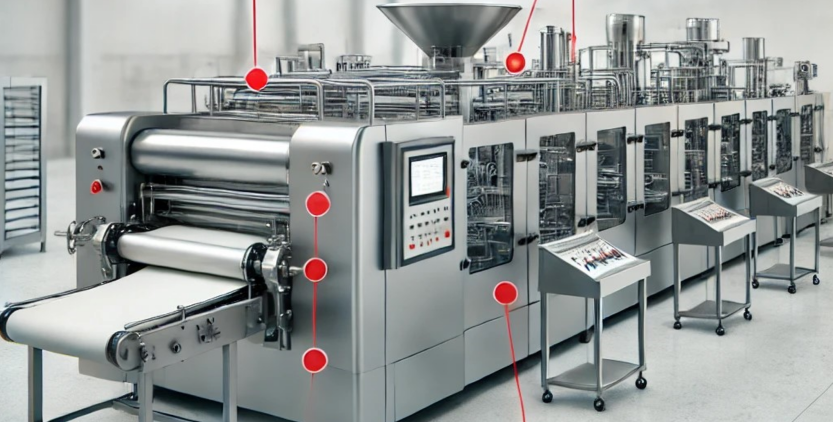Next-Level Machine Condition Monitoring in the Food Production

Relative to the previous areas that we looked into the Machine Condition Monitoring (MCM) being used in the Construction Equipment and CNC Machines, food industry can highly benefit from this vital practice. Food industry has its own particular challenges, such as strict regularity standards, lifespan of the goods being produced, contamination and much more. MCM can help in maintaining high levels of operational performance and can overcome such challenges.
Particularly in food industry, MCM can be implemented via methods such as:
- Vibration Analysis
As used in other industries, this type of analysis can help monitoring rotating machinery such as motors and conveyors. The analysis helps to detect imbalances, misalignments and bearing failures. For the food industry, this is highly important as any halt during production, may cause issues in product quality and large delays. - Thermal Imaging
Continous monitoring of heat signatures of the machinery and equipment can help to find issues such as unexpected levels of friction, electrical faults, or lubrications issues. Such issues can cause larger issues such a contamination or spoilage of products. The detection of these would be a large win for the operations. - Oil Analysis
Mixers, grinders and many more other machinery in food industry require lubrication for the longevity of the machinery and also for the hygenic proccessing requirements. Continously analysing the condition of the lubrications being used can reveal the presence of the contaminants and wear particles. - Acoustic Emission (AE) Monitoring
AE monitoring detects high-frequency sound waves produced by mechanical changes in equipment. This method is useful for early detection of issues in critical machinery components, such as cracking or material fatigue, which could compromise the hygiene and safety standards in food process.

However, getting to a stage of implementing and getting a value out from MCM could be challenging due to factors such as:
- High Investment Costs
There can be significant costs due to vendor-lock in where each manufacturer of the machinery can provide a non-complete solution of their own MCM implementation. These can be non-transparent in terms of costs and longevity of the system. - Data Management
The volume of the data being generated by MCM systems, especially if there are multiple vendors providing MCM system for each machinery can be challenging, not only in terms of volume, but also managing access priviledges, extraction of actionable insights. - Training & Expertise
MCM systems in the industry can be daunting in terms of its complexity. For this, training personal to understand the outputs of such systems can be essential. However, this is resouce intesive and time consuming.
Overall, MCM is a crucial practice for the food industry, and offers benefits such as enhanced & reliable product quality, reduction of downtime, cost efficiency and also regulatory compliance. In ADG, we overcome such challenges by providing next generation of MCM tools.
To learn more about our Machine Condition Monitoring solutions, contact us.

